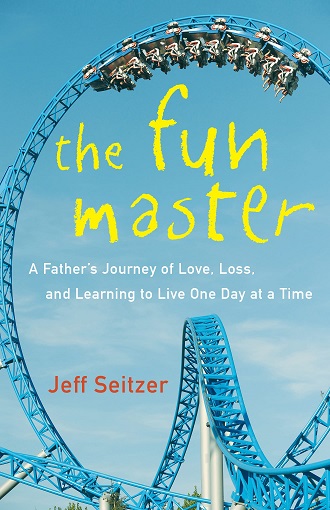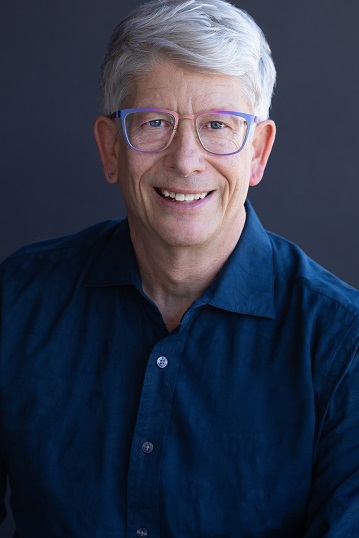Telling what really happened was a very slow, painful process. I could complete only a few sentences before being overcome with emotion. Eventually, I put his death into words and began to accept that he was gone in his magnificent physical form.
Jeff Seitzer – 27 April 2023
The Back Flap
Jeff Seitzer could hardly take care of himself, let alone a child with special needs, when his son, Ethan, was born–but Ethan chose him anyway, and Jeff, to his great surprise, rose to the challenge. Despite a myriad of health and other challenges, Ethan went on to thrive during his short life–all the while teaching Jeff that the true path to happiness is putting other people’s needs before your own and living in the moment rather than trying to control it.
About the book
What is the book about?
“The vision thing,” as my wife Janet puts it. Both Janet and I had different ideas about what life would be like after our first child Ethan was born. She imagined cuddling with him on the front porch swing, while I expected to return to my own extensive self-care regimen.
It didn’t work out that way for either of us after Ethan was born in fragile health. Janet couldn’t even hold him for his first two weeks, because he was on a ventilator and in an artificially induced coma to aid his recovery from two major surgeries. When he left the hospital, he required constant care, which Janet mostly provided until she returned to work. Then, I became his fulltime caregiver.
A self-involved academic with neurological problems of my own, I could hardly take care of myself, let alone a child with special needs. I had to learn to live entirely differently. It was quickly clear to me that Ethan, though forty-two years my junior, was teaching me how to live in the moment rather than try to control every moment. I found happiness that had eluded me before by putting other people’s needs before my own.
When did you start writing the book?
My wife Janet and I were shattered by Ethan’s tragic death. Fortunately, friends and family enfolded us in their loving arms and helped us care for Ethan’s baby sister Penelope. After about six months, we were still quite shaky, but we had recovered enough to function in an everyday sense. By then, Ethan’s godmother had finished transcribing my 4, 000 pages of notes about my time with Ethan and Penelope. I spent several months reading through the extensive computer files and developing possible story lines. About a month before the first anniversary of his death in August 2011, I began writing The Fun Master.
How long did it take you to write it?
It took me about six years total. I never had a lot of time to devote to writing. Grieving and taking care of Ethan’s younger sister Penelope took most of my time and energy for the first year after Ethan died. Then, I returned to teaching and resumed volunteering actively in her school, at a local children’s hospital, for our neighborhood association, and in our parish. All this left only an hour or two a day to work on the book.
Where did you get the idea from?
It popped into my head quite literally while Ethan and I were drowning together in Lake Michigan. Desperately trying to carry him to the surface, my arms and legs gave out, and I was certain we were going to die together. My last thought before blacking out was, “I will not be able to tell his story.” When I miraculously survived after several minutes underwater, I was convinced that I was spared to write a memoir about his life. Because our lives were so intricately intertwined, I would also be telling my story.
Were there any parts of the book where you struggled?
Whenever I attempted to write about his death, I reexperienced that terrible event, under water, drowning together.
Unable to face the true ending, I came up with an artistic workaround in the form of a neo-Greek tragedy as a final chapter. It was well-received by colleagues. But they also rightly pointed out that people would want to know what really happened.
Telling what really happened was a very slow, painful process. I could complete only a few sentences before being overcome with emotion. Eventually, I put his death into words and began to accept that he was gone in his magnificent physical form.
What came easily?
Writing about our life together, the moments of sadness and joy, copious laughter, and even the considerable pain, both physical and emotional, felt magical, like a form of channeling, where Ethan came alive for me. I could hear him speak, his friends and other people as well.
Are your characters entirely fictitious or have you borrowed from real world people you know?
All the characters are real world people. Seeing some of them occasionally and revisiting key moments we all shared helped me write the book. It also meant that I had to be very careful about how I portrayed people and key events. My goal was to depict them honestly, but not in a way that would offend them.
We all know how important it is for writers to read. Are there any particular authors that have influenced how you write and, if so, how have they influenced you?
Raymond Carver’s austere, though evocative, portrayal of everyday life. A lot of emotion is expressed through the setting of the scene and the action portrayed. I find this especially affecting, more so in fact than if the emotions were described in detail and with florid language.
Do you have a target reader?
People who have health challenges or disabilities, who find parenting and relationships both rewarding and challenging, who value humility and empathy, especially in men, who do not take themselves too seriously, and who can experience personal growth without feeling entitled to instruct others about life.
About Writing
Do you have a writing process? If so can you please describe it?
Kinetic. A childhood bout with encephalitis left me very hyperactive. There is a lot of movement in all that I do, including writing.
I always start with a notebook. I jot down whatever comes into my head until I can’t think of anything or begin repeating myself. I leave it aside, making mental notes of new ideas as I go through the rest of my day. I return to the notebook the next day and start over again. After several iterations, I sit with the notebook in front of me without writing. That means it is time to write on the computer.
I follow the same approach on the computer. Once I have a rough draft of the chapter, I set that aside and begin another. Whenever things are not flowing, I return to the notebook for a time, jumping back on the computer when there is no effective movement.
Revisions proceed much in the same way. I never press when things are not flowing. I simply mark where I stopped with a note about what was not working. I return after working on something else for a while.
Finally, I avoid writing or revising in the evenings. When I am tired, everything seems worse than it is, and I do a lot of damage trying to make it work.
Do you outline? If so, do you do so extensively or just chapter headings and a couple of sentences?
I do not do a formal outline. Instead, I work extensively with notebooks and notes to myself within a work in progress. These are all very provisional. I keep revising how I think things fit together as I go along.
Do you edit as you go or wait until you’ve finished?
When the writing is not flowing, I will edit other chapters. But I only edit as long it seems productive. After leaving myself a quick note in the text about what I was trying to do or what I think is not working, I parachute into another chapter or jump over to another project altogether.
While doing this other work or just taking care of everyday tasks, I often realize what was not working or what I need to do in a particular section. Then, I am right back at it.
Did you hire a professional editor?
Before I found a publisher with in-house copy editors and proofreaders, I worked with a coach for some of the chapters, and then had a manuscript review done for the draft manuscript.
Do you listen to music while you write? If yes, what gets the fingers tapping?
Rarely. First, I often write under unusual circumstances and in odd places. Waiting to pick up our daughter, for example, or in the backyard in the early morning. The times and setting are usually not right for music.
Also, being hyperactive, I try to keep my fingers from tapping, since my leg is often already shaking. So, when I do listen to music while writing, it is typically classical music.
About Publishing
Did you submit your work to Agents?
Yes. I got several positive responses. In fact, I got a manuscript request on my first try. But I got no takers in the end.
What made you decide to go Indie, whether self-publishing or with an indie publisher? Was it a particular event or a gradual process?
Agents and publishers had pretty much the same take on my work. Great story, excellent writing, middling platform. I was not offended by this. It was an accurate assessment. I knew that memoir was a tough sell, that is, for a noncelebrity. So, I went with a hybrid press, SparkPress. It was a good option for me.
Did you get your book cover professionally done or did you do it yourself?
Professionally done by SparkPress. I contributed the basic idea for the cover. They took the idea and did a fabulous job producing a final cover. It has gotten a lot of praise from readers, including my teenage daughter, who is very discerning critic.
Do you have a marketing plan for the book or are you just winging it?
I set up a launch party and three readings/book signings on my own. My publicity team at Books Forward solicited guest articles, interviews, and podcast appearances as well as managed a digital marketing campaign. These opportunities have led to more ongoing engagement. Now, I am working on my own with a focus on publishing more widely and scheduling podcasts appearances aimed at target audiences.
Any advice that you would like to give to other newbies considering becoming Indie authors?
If you are committed to your story and convinced of the need to tell it, then it will be a worthwhile experience. It will resonate with those who take a chance on it. That’s what really matters.
About You
Where did you grow up?
Omaha, Nebraska
Where do you live now?
Chicago, IL
What would you like readers to know about you?
I write about serious topics, though I am not especially serious myself. My memoir is told with wry, self-deprecating humor.
What are you working on now?
A novella based on a recently discovered piece of family history. According to a 1927 Des Moines Register article, a tree fell into the Missouri River in the early 1880s between Omaha, Nebraska and Council Bluffs, Iowa. Within a year, sediment formed a large island, 800 square acres at its greatest extent. It was a stateless area in legal terms. My great grandfather filled a rowboat with supplies, tied some mules to the back, rowed out to claim it. He established a 200-acre farm, fought off rival claimants, including criminal gangs, and won title to the island.
End of Interview:
For more from Jeff Seitzer visit his website.
Get your copy of The Fun Master from Amazon US or Amazon UK.


